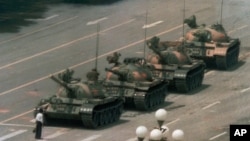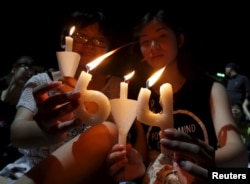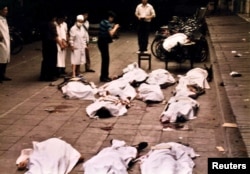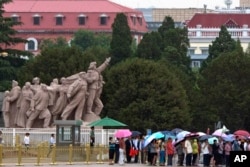Rights activists in Hong Kong are set to commemorate the anniversary of China’s Tiananmen Square protests, once again calling on China to revise its official explanation of the event.
Sunday marks 28 years since Chinese tanks rolled into crowds of demonstrators in Tiananmen Square, opening fire and killing hundreds of pro-democracy activists. Some estimates put the total number of dead in the thousands.
China’s government refers to the event as the June 4th Incident and downplays its severity. Discussion of the event in media or textbooks is largely forbidden.
But in Hong Kong, activists remember the June 4 protests every year and mourn the victims. Richard Choi of Hong Kong’s Alliance in Support of the Patriotic Movement in China told reporters this week that the group’s work “will remain unfinished” until the government revises its official explanation of the event.
Keeping memories alive
While some say that Chinese born after 1989 are largely unaware of the Tiananmen Square protests, Choi said students and other young adults in Hong Kong are keeping the memory alive.
“Various student groups have held their own memorial activities in various forms over the past two or three years," he said. "I think the younger generation does still care about June 4.”
Britain gave Hong Kong back to the Chinese in 1997, but it has retained much of its traditions of free speech and association. Critics, however, say those freedoms are being weakened as time goes on.
Lee Cheuk-yan, another leader of the Alliance in Support of the Patriotic Movement in China, told reporters a candlelight vigil his group is hosting Sunday also is a way to express anger at Chinese authorities ahead of the 20th anniversary of the British turnover of Hong Kong to Beijing July 1.
HRW: ‘China buries the truth’
Human Rights Watch called on Beijing this week to acknowledge its role in the deaths of the Tiananmen Square protesters in 1989, and allow Chinese citizens to commemorate the event. It also called on Chinese leaders to release people imprisoned for speaking out about the protests in the past.
“While President Xi Jinping preaches openness on the world stage, his government buries the truth about the Tiananmen Massacre through silence, denial and persecution of those who mark the occasion," Sophie Richardson, the group’s China director, said. She added, “Until Beijing reverses course and owns up to its past atrocities, Xi’s calls have little credibility.”
The Tiananmen Square protests were born out of peaceful protests held in public in several Chinese cities in April 1989, calling for freedom of expression and an end to government corruption. The Chinese government responded by declaring martial law in May.
On June 3 and 4, members of the military opened fire on the demonstrators in Beijing. Some fought back by attacking military convoys and setting military vehicles alight. The government responded by cracking down on dissent and arresting thousands for counterrevolution, arson and disrupting social order.
While some of the protesters and supporters have since died or otherwise gone silent in the past 28 years, new evidence illustrating the event is still surfacing. On June 1, The New York Times published photographs taken at Tiananmen Square in 1989 by David Chen, then a university student and pro-democracy organizer, who moved to the United States in 2012.
“Twenty-eight years have passed,” Chen told the Times. “The world should know what happened.”








